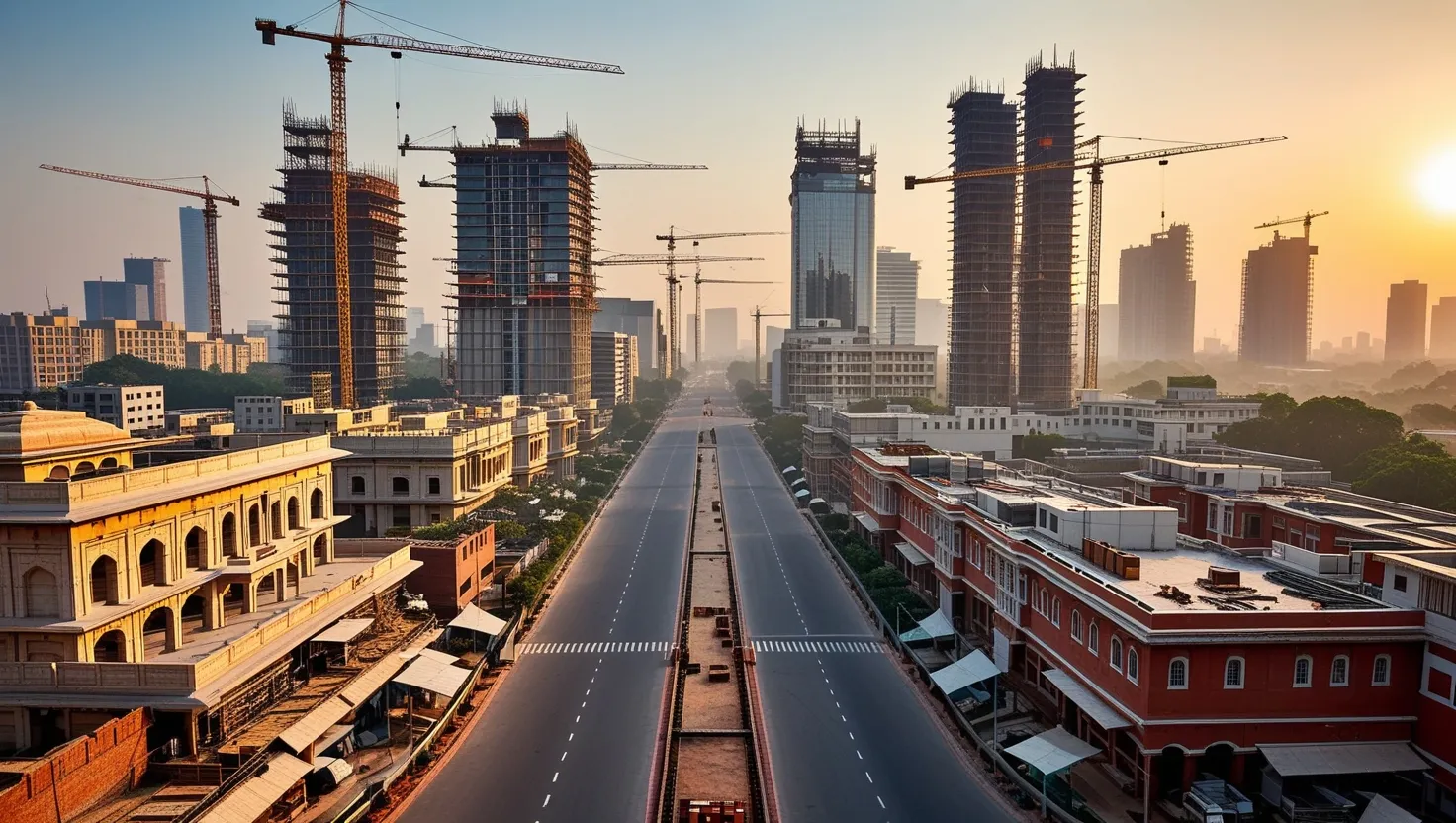The Indian government is really pushing to use different types of fuel, moving away from the usual petrol and diesel. This effort is because oil prices keep changing a lot, which can mess with the country’s money and harm the environment by adding to pollution.
They're focusing a lot on cleaner fuels like electric cars, ethanol, and something called green hydrogen, which don't pollute as much. The government believes in these new fuels not just to reduce pollution but also to help India make its own energy and even sell it to other countries.
A big part of this new direction is using Compressed Natural Gas, or CNG, which they think will play a big role in the country's energy future. People are excited about CNG because it's seen as a way to cut down on pollution and save on fuel costs. Nitin Gadkari, who's really behind this push, thinks that India can use CNG to not only use less fuel from other countries but also start selling its own fuel.
This focus on CNG and cleaner fuels also comes from worries about how oil prices can jump around because of international issues, affecting both the economy and the environment. Burning fossil fuels is a big reason for the pollution that causes climate change, making up 12% of India's pollution from energy use. This highlights why there's a big need to switch to fuels like CNG that are better for the planet and can help save money too.
Overall, the move towards using CNG and other cleaner fuels shows the Indian government's broad plan to adopt alternative fuels. This plan aims to make the economy stronger, protect the environment, and position India as a leader in using cleaner energy, with CNG being a key part of reaching these big goals.
CNG's Growing Influence in India's Shift Toward Cleaner Energy
How CNG is Becoming More Popular
India's Compressed Natural Gas (CNG) industry is booming, showing how committed the country is to finding better fuel options. From just 3.5% of new cars being CNG-powered in 2019, the number rose to 11% by 2022. It's expected to hit 18% in five more years. Big car makers, Bajaj Auto and Maruti Suzuki, have jumped on this trend, grabbing market shares of 79% and 75%. Maruti Suzuki, in particular, has seen its CNG car sales quadruple in six years. What's more, Bajaj Auto is even looking to introduce the first CNG motorcycle, widening CNG's appeal beyond cars and rickshaws.
Support from the Government and Car Industry
The government is really pushing for CNG, backing it up with policies and support that aim to reduce the need for imported oil and make the environment cleaner. This isn't just talk; there's real action and investment going into making CNG a big part of India's energy mix. The car industry, from big names to new startups, is all in, creating a wave of positive change towards greener energy solutions.
Why CNG Matters So Much
CNG is stepping up not just because it's better for the planet but also as a smart move for India's economy, helping to deal with the ups and downs of global oil prices. By choosing CNG, which is cheaper and cleaner, India can spend less on oil from other countries and also cut down on pollution.
CNG's rise in India is a big deal, driven by the government's forward-thinking strategies and the car industry's innovation. The increasing sales of CNG vehicles and investment in the necessary infrastructure show India is serious about changing how it uses energy. This shift to CNG is a clear sign of India's efforts to be more environmentally friendly and less dependent on foreign oil, marking a significant change in the country's approach to energy.
CNG: Good for the Planet and Your Wallet
Why CNG is Better for the Air
Compressed Natural Gas, or CNG, is way better for the environment than the usual petrol or diesel. Cars that run on CNG don't put out as much bad stuff into the air. This means less of the gases that can make the earth warmer, like nitrogen oxide and carbon monoxide. In fact, CNG cars make 10% less CO2 than diesel cars and 25% less than petrol cars. By using CNG, we're helping to keep the air cleaner and fight against global warming, which is good for everyone.
Saving Money with CNG
CNG isn't just good for the earth; it's also kind to your budget. It can take you further on less fuel, which means you spend less money to drive the same distance. Take the Maruti Alto 800, for example. It can go over 31 km on one kg of CNG, but only about 28.7 km on one litre of petrol. This could save a family using a CNG car about 50,000 Rupees every year compared to a petrol car. So, switching to CNG is a smart move if you want to cut down on fuel costs.
How CNG Started to Catch On in India
CNG got a big push in India back in 1998, thanks to a Supreme Court order. The court said that all auto-rickshaws and buses in Delhi had to use CNG or LPG to help reduce pollution. This was a big deal and really started the CNG movement in the country. It showed how important it is for the government to step in and help make the air cleaner by supporting cleaner fuels like CNG.
CNG is great for two big reasons: it's better for the planet and it can save you money. With the government's help, CNG has become a big part of making India's air cleaner and reducing the country's pollution. More and more people are choosing CNG because it's a practical and cheaper option for getting around. The move towards CNG since 1998 has shown how making smart choices about the fuel we use can make a big difference in fighting pollution and saving money at the same time. As more people switch to CNG, it plays a big part in creating a cleaner, more sustainable future for everyone in India.
Growing CNG Network and New Chances in India
More CNG Stations Coming
India is getting serious about using more CNG (Compressed Natural Gas) by planning to set up a lot more CNG stations. Right now, there are about 6,088 places where you can fill up your car with CNG, but by 2030, they want to have 17,700 stations. This is a big deal because it means people won't have to wait in long lines for CNG anymore, making it easier for everyone to use this cleaner fuel.
Cool Inventions for CNG Cars and Bikes
Car and bike companies are coming up with smart ideas to use CNG. Bajaj Auto, for example, is working on making the first motorcycle that runs on CNG. This is exciting because motorcycles haven't used CNG much before. A CNG bike could travel over 101.8 km with just one kg of CNG, which is great for saving money on fuel and cutting down on pollution.
New Business and Savings for Everyone
As CNG becomes more popular, there are lots of opportunities for people to start new businesses or save money. For example, with more people wanting CNG, there's a big chance to open new CNG stations. Also, some services can switch regular cars to run on CNG, which is cheaper and cleaner. Plus, the government is making it easier by not requiring special permits for CNG or electric vehicles, which could lead to more businesses using these kinds of cars and bikes.
What This All Means
India's move to use more CNG is a big step toward cleaner air and a healthier planet. With more CNG stations and new types of CNG vehicles being developed, it's becoming a better option for drivers and the environment. This change is creating lots of new chances for businesses and helping people save money. As CNG grows in India, it's making a big difference in how the country uses energy and takes care of the environment.
How is CNG a better Intermediate Option:
The Government of India sees Compressed Natural Gas (CNG) as a complementary or advantageous option alongside Electric Vehicles (EVs) for several reasons, particularly in the current phase of transitioning towards cleaner energy sources. While EVs are seen as a long-term solution to reduce carbon emissions and dependency on fossil fuels, CNG offers immediate and practical benefits that align with the country's environmental and economic objectives. Here's why the government might view CNG favorably in comparison to or alongside EVs:
Infrastructure and Adoption Readiness
Existing Infrastructure: India already has a foundational infrastructure for CNG distribution, which can be expanded more rapidly than establishing new EV charging stations nationwide. This makes CNG a readily accessible option for reducing emissions in the near term.
Faster Adoption: Transitioning fleets and individual vehicles to CNG can be achieved faster due to existing technology and infrastructure, offering immediate environmental benefits and reduction in oil imports.
Economic Considerations
Cost-Effective Transition: For many consumers and businesses, CNG vehicles are more cost-effective to purchase and operate compared to EVs, mainly due to the high initial cost of EVs and the limited availability of charging infrastructure. This economic factor plays a crucial role in adoption rates in price-sensitive markets like India.
Energy Security: By promoting CNG, India can reduce its reliance on imported crude oil, improving energy security. CNG is produced domestically, which supports the national economy and reduces vulnerability to global oil price fluctuations.
Environmental Impact
Immediate Pollution Reduction: CNG burns cleaner than petrol or diesel, significantly reducing emissions of harmful pollutants such as NOx, CO, and particulate matter. While EVs offer zero tailpipe emissions, the overall reduction in environmental impact with CNG vehicles can be realized sooner due to quicker adoption rates.
Complementarity with EVs: The government likely views CNG not as a competitor to EVs but as a complementary technology. CNG can serve as a bridge in the transition towards a fully electric future, especially in sectors where electrification is challenging in the short to medium term, such as heavy transport and certain types of commercial vehicles.
Technological Development and Consumer Choice
Diverse Energy Mix: Promoting CNG alongside EVs allows for a more diversified energy mix, giving consumers and businesses more options based on their needs, preferences, and capabilities.
R&D and Innovation: Investment in CNG technology stimulates research and development in clean energy technologies, contributing to the broader goal of sustainable transportation.
In summary, the Government of India's support for CNG, in addition to EVs, is rooted in practical considerations of immediate environmental benefits, economic factors, and the existing infrastructure. CNG offers a viable path to reduce emissions and oil dependence quickly while the country continues to build out its EV infrastructure and technology for a greener future.
Summary
- Market Growth and Adoption: The popularity of CNG vehicles is on the rise, with their market share increasing from 3.5% in 2019 to 11% in 2022, and projected to hit 18% by the next five years. Leading automotive manufacturers like Bajaj Auto and Maruti Suzuki are spearheading this growth, capturing significant market shares and innovating with products like the world's first CNG-powered motorcycle.
- Environmental and Economic Benefits: CNG offers considerable advantages over conventional fuels, producing significantly fewer pollutants and providing cost savings on fuel. For instance, a CNG vehicle can save a family around 50,000 Rupees annually compared to a petrol vehicle.
- Infrastructure and Innovation: India's commitment to expanding its CNG infrastructure is evident in its plan to increase the number of CNG stations from 6,088 to 17,700 by 2030. This expansion is crucial for supporting the growing number of CNG vehicles and reducing wait times at stations.
- Opportunities for Entrepreneurs and Consumers: The growing CNG sector opens up numerous opportunities, from the potential for new CNG station ventures to retrofitting services that convert conventional vehicles to CNG. Policy changes, such as exempting CNG vehicles from certain permit requirements, further support the sector's growth and encourage the adoption of CNG for commercial transportation.
In summary, India's move towards CNG reflects a comprehensive strategy to embrace cleaner energy sources, driven by environmental, economic, and strategic considerations. The support from the government, coupled with industry innovation and market dynamics, underscores a significant shift in India's energy landscape, presenting a model for sustainable development and energy security. As CNG continues to gain traction, its benefits extend not just to reducing India's carbon footprint and fuel expenses but also in offering new business opportunities and promoting technological advancements in the automotive sector.






